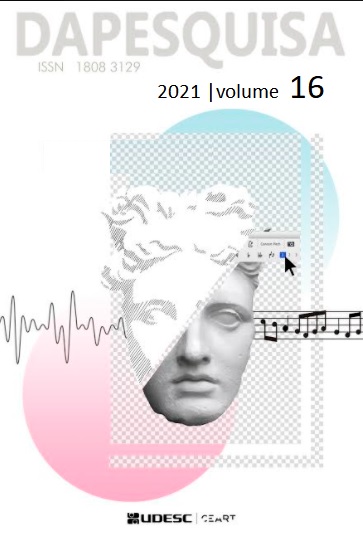Online non-formal education in design
Online non-forma quantitative analysis of Udemy Graphic Design courses
DOI:
https://doi.org/10.5965/18083129152021e0020Keywords:
Non-formal education, Web-based instruction, Drawing - Study and teaching, Educational innovations, Educational technologyAbstract
Online education has emerged today as an alternative to formal education. Through digital information and communication technologies, one can study using different devices about tools, techniques and software, which has become even more popular in the area of Design. In this context, the aim of this study is to conduct a quantitative conceptual analysis of a database of 603 Graphic Design courses of Udemy platform, which offers online courses in various subjects. A general description of the courses, their levels and other variables are approached from descriptive statistics. As a result, there was a predominance of tool-related courses and courses for all levels or beginners. From the quantitative analysis, reflections on Design Education and Design Research as previously established are drawn, facing a possible new educational paradigm that has gained relevance in recent years: that of non-formal education.
Downloads
References
BASTOS, R. C.; BIAGIOTTI, B. MOOCs: uma alternativa para a democratização do ensino. RENOTE, Porto Alegre, v. 12, n. 1, 2014. DOI: https://doi.org/10.22456/1679-1916.50333. Disponível em: https://www.seer.ufrgs.br/renote/article/view/50333. Acesso em: 26 mai. 2020. DOI: https://doi.org/10.22456/1679-1916.50333
BAYAZIT, N. Investigating Design: A Review of Forty Years of Design Research. Design Issues, Massachusetts, v. 20, n. 1, p. 16–29, Winter 2004. DOI: https://doi.org/10.1162/074793604772933739 DOI: https://doi.org/10.1162/074793604772933739
BÜRDEK, B. E. História, teoria e prática do design de produtos. São Paulo: Edgard Blucher, 2006.
CASTELLS, M. O poder da comunicação. Rio de Janeiro: Paz e Terra, 2015.
CASTELLS, M. A sociedade em rede. 11ª ed. São Paulo: Paz e Terra, 2011.
CROSS, N. Developments in Design Methodology. John Wiley : UK, 1984.
DATA.WORLD. About us. Disponível em: https://data.world/company/about-us/. Acesso em: 11 out. 2019.
DEMO, P. Professor do Futuro e Reconstrução do Conhecimento. Rio de Janeiro: Vozes, 2009.
DEMO, P. Ser Professor é Cuidar que o Aluno Aprenda. Porto Alegre: Mediação, 2014.
DESCARTES, R. O Discurso do Método. 3. ed. São Paulo: Martins Flores, 2001.
FONTOURA, A. M. As Manifestações pós-modernistas no desenho industrial e suas repercussões no ensino do projeto de produto. 1997. Dissertação (Mestrado em Educação ) - Pontifícia Universidade Católica do Paraná, Curitiba, 1997.
FRANCO, S. R. K. O Construtivismo e a Educação. Porto Alegre: Artes Médicas, 2004.
GASPAR, A. A educação formal e a educação informal em ciências. In: Massarani L.; Moreira I. C.; Brito F. (org.). Ciência e público: caminhos da divulgação científica no Brasil. Rio de Janeiro : Casa da Ciência/UFRJ, 2002. p. 171-183. Disponível em: https://goo.gl/Pth5ZQ. Acesso em: 8 jan. 2019.
GOOGLE Finance. 2019. Disponível em: https://www.google.com/finance/. Acesso em: 6 out. 2019.
GOMES, R. P. Revisão sistemática de publicações do periódico Design Studies com o suporte de técnicas de mineração de dados e de textos. Dissertação (Mestrado em Design) – Centro Universitário Ritter dos Reis, Porto Alegre, 2018.
GOMES, R. P. et al. Aplicação de revisão sistemática com suporte de mineração de dados e de textos: o caso do periódico Design Studies. Em Questão, Porto Alegre, v. 25, n. 3, p. 156-183, set./dez. 2019. DOI: http://dx.doi.org/10.19132/1808-5245253.156-183 . DOI: https://doi.org/10.19132/1808-5245253.156-183
MCLUHAN, M. Os meios de comunicação como extensões do homem. São Paulo: Cultrix, 1969.
MEGGS, P. B.; PURVIS, A. W. História do design gráfico. São Paulo: Cosac Naify, 2009.
MILLER, J. A.; LUPTON, E. (org.). ABC da bauhaus: a Bauhaus e a teoria do design. São Paulo: Cosac Naify, 2008.
MORAES, D. Pós-graduação em design no Brasil: cenários e perspectivas. Estudos em Design, Rio de Janeiro, v. 22, n. 3, p. 1–12, 2014.
PAPERT, S. Mindstorms: children, computers, and powerful ideas. New York: Basic Books, 1980.
RAABE, A. L. A. et al. Educação criativa: multiplicando experiências para a aprendizagem. Recife: Pipa Comunicação, 2016. E-book. Disponível em: https://www.pipacomunica.com.br/livrariadapipa/produto/educacao-criativa/.Acesso em: 01 out. 2019.
SAMPIERI, R.; COLLADO, C.; LUCIO, M. Metodologia de Pesquisa. Porto Alegre: Penso Editora, 2013.
SANTAELLA, L. Pós-humano — por quê?. Revista USP, São Paulo, n. 74, p. 126-137, jun-ago, 2007. Disponível em: https://www.revistas.usp.br/revusp/article/download/13607/15425. Acesso em: 7 jan. 2019. DOI: https://doi.org/10.11606/issn.2316-9036.v0i74p126-137
SANTAELLA, L. A aprendizagem ubíqua substitui a educação formal? Comunicação e Tecnologia, São Paulo, v. 2, n. 1, 2010. Disponível em: https://revistas.pucsp.br/index.php/ReCET/article/viewFile/3852/2515. Acesso em: 15 out. 2019.
TEXTALYSER. 2019. Disponível em: . Acesso em: 11 out. 2019.
UDEMY. 2019. Disponível em: <http://www.udemy.com>. Acesso em: 06 out. 2019.
VALENTE, J. A.; ALMEIDA F. J. Visão analítica da Informática na Educação no Brasil: A questão da formação do professor. Revista Brasileira de Informática na Educação, n. 1, 1997.
VINHAS, O.; JUNGBLUT, H.; GOMES, R. P. Da razão à performance: a educação sob a constituição do pós-humano na era da internet ubíqua. RELACult - Revista Latino-Americana de Estudos em Cultura e Sociedade, Foz do Iguaçu, v. 5, Edição Especial - IV EHM, abr., 2019. DOI: https://doi.org/10.23899/relacult.v5i4.1370 DOI: https://doi.org/10.23899/relacult.v5i4.1370
VYGOTSKY, L. A Formação Social da Mente. 7. ed. São Paulo: Martins Fontes, 2007.
Published
How to Cite
Issue
Section
License
Copyright (c) 2021 Rafael Peduzzi Gomes, Vinicius Gadis Ribeiro, Sidnei Renato Silveira

This work is licensed under a Creative Commons Attribution 4.0 International License.
Authors who publish in this journal agree to the following terms:
The authors retain the copyright and grant the journal the right of first publication, with the study being simultaneously licensed under the Creative Commons Attribution-Noncommercial License, which allows the sharing of work with acknowledgment of authorship and initial publication in this journal.
This journal, following the recommendations of the Open Access movement, provides public access to all its content, following the principle that free access to research leads to a greater global exchange of knowledge.
Plagiarism in all its forms constitutes unethical publication behavior and is unacceptable. The Journal DAPesquisa reserves the right to use software or other methods of detecting plagiarism to analyze submitted works.





